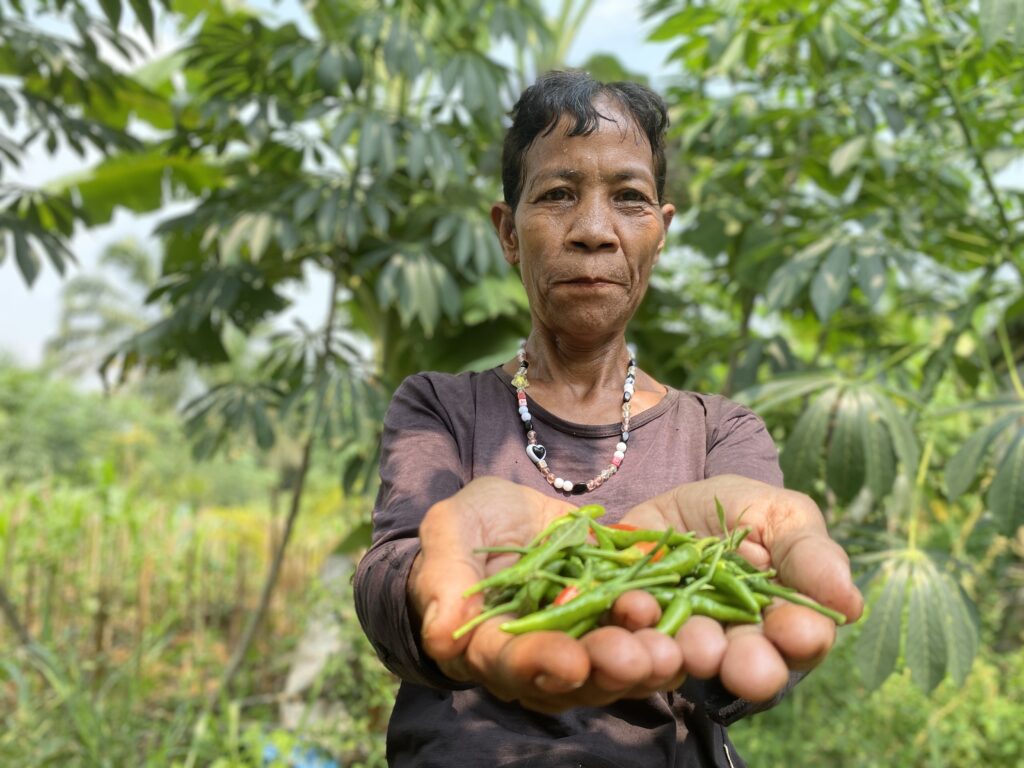Pundi Sumatra, in the Estungkara program as part of encouraging social inclusion in the SAD community, provides assistance to the Suku Anak Dalam (SAD) community. Suku Anak Dalam (SAD), one of the indigenous communities in Jambi Province, has lived for quite a long time by relying on the forest as a source of livelihood. However, modernization and massive forest encroachment for oil palm plantations and other development programs have squeezed living space and forced the SAD community to face serious challenges. They must adapt to these changes while still trying to maintain their cultural identity, land rights, and environmental sustainability.
Several successful independence activities include agricultural business management, workshop training, development of cultivation techniques through environmental engineering that relies on oxygen supply and utilization of microorganisms in pond water for fish farming (biofloc), to education and health services for the community. However, many challenges in terms of basic service fulfillment still need to be fought for, such as access to formal education, limited health services, and complex land issues.
In order to increase public awareness about the living conditions of indigenous peoples, Pundi Sumatra held a Journalist Visit activity which took place from 20 to 22 September 2024. This activity involved journalists from national media such as Mongabay, Kompas TV, CNN Indonesia, and Kompas.com, to see firsthand various good practices and challenges faced by the Suku Anak Dalam (SAD) community in Pelepat District, Bungo Regency, and Bathin VIII District, Sarolangun Regency, Jambi Province.
During the Journalist Visit activity, participants were invited to see firsthand some of the good practices of the SAD community in a joint discussion agenda. In the discussion and interview sessions, the community talked about the long-term lifestyle changes that they began to realize. Samsu, one of the SAD communities in Dwi Karya Bakti Village, Bungo Regency, said that forest products were increasingly difficult to obtain and forced them to change their livelihoods.
"The forest is now difficult, we can no longer depend on the forest to survive. If you have land, you should try gardening now," said Samsu.
One of Samsu's efforts to develop is to send his only daughter to study in the city. Juliana, who has just completed her final exam at the Muhammadiyah University of Jambi, is the main focus of this visit. Juliana is not only a symbol of hope for women in her community, but also shows that education can be a way out of the negative stigma often faced by this indigenous community.
This story caught the attention of journalists, who saw first-hand the role of SAD women in small smoked fish business groups and their involvement. SAD woman as a posyandu cadre. Dewi Yunita as CEO of Pundi Sumatra said that women from Rombong Hari and Badai were never involved in group activities. Since the first time accompanying, only the male group was allowed to discuss outside with Pundi Sumatra.
"Currently, indigenous women of the Anak Dalam Tribe have been involved in many activities, some have become group leaders, become cadres of the Porsyandu, and have dared to appear at meetings with outside parties," said Dewi.
Furthermore, she also explained that empowering women is the same as creating advanced and developing generations. The hope is that from women who take part in empowering groups, women's voices and concerns regarding households can be advocated together.
Moving from the SAD community in Dwi Karya Bakti Village, Bungo Regency, in the SAD Community, Limbur Tembesi Village, the Journalist Visit participants observed various other empowerment activities carried out, such as fish farming using biofloc media, agricultural field school programs, and workshop activities. All of this aims to provide alternative sources of livelihood for communities that are increasingly losing access to forest products.
In a discussion with journalists, Tumenggung Juray told of their concerns after living without their forest. Now they live in the midst of social activities without skills. As a result, their vitality is decreasing.
"We often pick up scrap iron on the side of the road to sell, collecting scrap. Some garden but the results are not optimal because of lack of capital and lack of skills," he said.
The unresolved social issues in the indigenous community of Suku Anak Dalam have made the government's work increasingly overwhelming and piling up. Some of the steps taken by Pundi Sumatra are to synergize with the local government. Among them are holding multi-party discussions to capture joint commitments, inviting policy makers to go to the field and have dialogues with the community, and holding journalist visits as part of the advocacy movement for empowerment through the media.
"Bringing out the independence of the SAD community cannot be realized in a short time, there is a long journey. In the SAD Bungo community, we have been assisting for about ten years. Slowly they have begun to be independent in accessing government services," said Yori Sandi as the program coordinator.
Elviza, one of the journalists who participated in this activity, said that the Suku Anak Dalam have always been a concern for journalists, considering their increasingly limited living space.
"The SAD community must always be the government's concern. The task of journalists is to oversee government policies that can realize the social inclusion of those who are marginalized," said Elviza, a journalist from Mongabay.
Furthermore, he also considered that the adaptation carried out by the Anak Dalam Tribe to survive by switching to plantations and having new skills was something interesting to spread.
The main objective of this Journalist Visit is for journalists to be able to see firsthand the socio-cultural dynamics that occur in the SAD community and document various good practices that have been carried out by this community with the support of Pundi Sumatra. It is hoped that the resulting media coverage can increase public awareness of the importance of protecting the rights of indigenous peoples as part of the spirit of social inclusion. And further encourage concrete steps from various parties to overcome existing problems.


